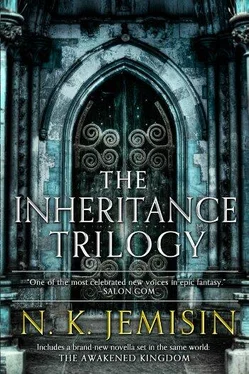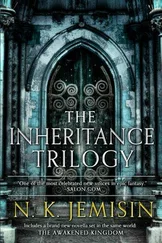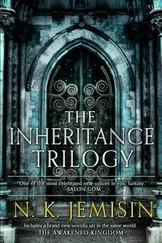The Kingdom of Gods
by N.K. Jemisin
BOOK ONE
Four Legs in the Morning
She looks so much like Enefa, I think, the first time I see her.
Not this moment, as she stands trembling in the lift alcove, her heartbeat so loud that it drums against my ears. This is not really the first time I’ve seen her. I have checked in on our investment now and again over the years, sneaking out of the palace on moonless nights. (Nahadoth is the one our masters fear most during those hours, not me.) I first met her when she was an infant. I crept in through the nursery window and perched on the railing of her crib to watch her. She watched me back, unusually quiet and solemn even then. Where other infants were fascinated by the world around them, she was constantly preoccupied by the second soul nestled against her own. I waited for her to go mad, and felt pity, but nothing more.
I next visited when she was two, toddling after her mother with great determination. Not mad yet. Again when she was five; I watched her sit at her father’s knee, listening raptly to his tales of the gods. Still not mad. When she was nine, I watched her mourn her father. By that point, it had become clear that she was not, and would never go, insane. Yet there was no doubt that Enefa’s soul affected her. Aside from her looks, there was the way she killed. I watched her climb out from beneath the corpse of her first man, panting and covered in filth, with a bloody stone knife in her hand. Though she was only thirteen years old, I felt no horror from her—which I should have, her heart’s fluctuations amplified by her double souls. There was only satisfaction in her face, and a very familiar coldness at her core. The warriors’ council women, who had expected to see her suffer, looked at each other in unease. Beyond the circle of older women, in the shadows, her watching mother smiled.
I fell in love with her then, just a little.
So now I drag her through my dead spaces, which I have never shown to another mortal, and it is to the corporeal core of my soul that I take her. (I would take her to my realm, show her my true soul, if I could.) I love her wonder as she walks among my little toy worlds. She tells me they are beautiful. I will cry when she dies for us.
Then Naha finds her. Pathetic, isn’t it? We two gods, the oldest and most powerful beings in the mortal realm, both besotted by a sweaty, angry little mortal girl. It is more than her looks. More than her ferocity, her instant maternal devotion, the speed with which she lunges to strike. She is more than Enefa, for Enefa never loved me so much, nor was Enefa so passionate in life and death. The old soul has been improved, somehow, by the new.
She chooses Nahadoth. I do not mind so much. She loves me, too, in her way. I am grateful.
And when it all ends and the miracle has occurred and she is a goddess (again), I weep. I am happy. But still so very alone.
Trickster, trickster
Stole the sun for a prank
Will you really ride it?
Where will you hide it?
Down by the riverbank!
There will be no tricks in this tale. I tell you this so that you can relax. You’ll listen more closely if you aren’t flinching every other instant, waiting for the pratfall. You will not reach the end and suddenly learn I have been talking to my other soul or making a lullaby of my life for someone’s unborn brat. I find such things disingenuous, so I will simply tell the tale as I lived it.
But wait, that’s not a real beginning. Time is an irritation, but it provides structure. Should I tell this in the mortal fashion? All right, then, linear. Slooooow. You require context.
Beginnings. They are not always what they seem. Nature is cycles, patterns, repetition—but of what we believe, of the beginning I understand, there was once only Maelstrom, the unknowable. Over a span of uncountable aeons, as none of us were here yet to count, It churned forth endless substances and concepts and creatures. Some of those must have been glorious, because even today the Maelstrom spins forth new life with regular randomness, and many of those creations are indeed beautiful and wondrous. But most of them last only an eyeblink or two before the Maelstrom rips them apart again, or they die of instant old age, or they collapse in on themselves and become tiny Maelstroms in turn. These are absorbed back into the greater cacophony.
But one day the Maelstrom made something that did not die. Indeed, this thing was remarkably like Itself—wild, churning, eternal, ever changing. Yet this new thing was ordered enough to think, and feel, and dedicate itself to its own survival. In token of which, the first thing it did was get the hells away from the Maelstrom.
But this new creature faced a terrible dilemma, because away from the Maelstrom there was nothing. No people, no places, no spaces, no darkness, no dimension, no EXISTENCE.
A bit much for even a god to endure. So this being—whom we shall call Nahadoth because that is a pretty name, and whom we shall label male for the sake of convenience if not completeness—promptly set out to create an existence, which he did by going mad and tearing himself apart.
This was remarkably effective. And thus Nahadoth found himself accompanied by a formless immensity of separate substance. Purpose and structure began to cohere around it simply as a side effect of the mass’s presence, but only so much of that could occur spontaneously. Much like the Maelstrom, it churned and howled and thundered; unlike the Maelstrom, it was not in any way alive .
It was, however, the earliest form of the universe and the gods’ realm that envelops it. This was a wonder—but Nahadoth likely did not notice, because he was a gibbering lunatic. So let us return to the Maelstrom.
I like to believe that It is aware. Eventually It must have noticed Its child’s loneliness and distress. So presently, It spat out another entity that was aware and that also managed to escape the havoc of its birth. This new one—who has always and only been male—named himself Bright Itempas, because he was an arrogant, self-absorbed son of a demon even then. And because Itempas is also a gigantic screaming twit, he attacked Nahadoth, who… well. Naha very likely did not make a good conversation partner at the time. Not that they talked at all, in those days before speech.
So they fought, and fought, and fought times a few million jillion nillion, until suddenly one or the other of them got tired of the whole thing and proposed a truce. Both of them claim to have done this, so I cannot tell which one is joking. And then, because they had to do something if they weren’t fighting and because they were the only living beings in the universe after all, they became lovers. Somewhere between all this—the fighting or the lovemaking, not so very different for those two—they had a powerful effect on the shapeless mass of substance that Nahadoth had given birth to. It gained more function, more structure. And all was well for another Really Long Time.
Then along came the Third, a she-creature named Enefa, who should have settled things because usually three of anything is better, more stable, than two. For a while this was the case. In fact, EXISTENCE became the universe, and the beings soon became a family, because it was Enefa’s nature to give meaning to anything she touched. I was the first of their many, many children.
So there we were: a universe, a father and a mother and a Naha, and a few hundred children. And our grandparent, I suppose—the Maelstrom, if one can count It as such given that It would destroy us all if we did not take care. And the mortals, when Enefa finally created them. I suppose those were like pets—part of the family and yet not really—to be indulged and disciplined and loved and kept safe in the finest of cages, on the gentlest of leashes. We only killed them when we had to.
Читать дальше












